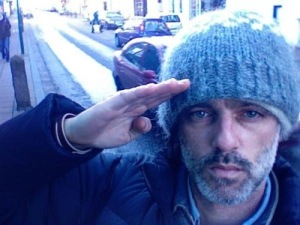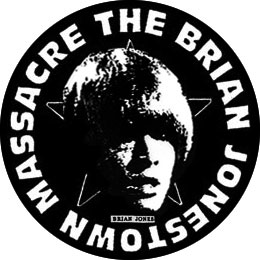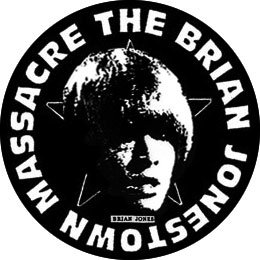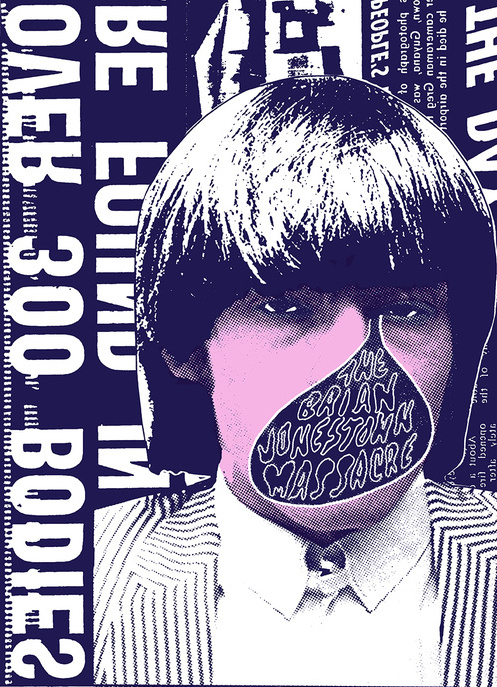BY JONATHAN VALANIA If you’ve not seen Dig, stop reading and go watch it. We’ll wait. [two hour pause while the reader watches Dig and learns everything he/she needs to know about The Brian Jonestown Massacre and probably more than he/she needs to know about The Dandy Warhols] I know, right? Told ya. Anyway, Brian Jonestown Massacre play Union Transfer tonight. To mark this auspicious occasion we present this reprise edition of our 2012 interview with BJM main man(iac) Anton Newcombe. Discussed: drugs, mental illness, early 70s disco, Dig, Dandy Warhols, the CIA, and Marilyn Monroe fucking John F. Kennedy. In other words, the usual small talk.
PHAWKER: You are living in Germany these days. Since when? Why?
ANTON NEWCOMBE: Well I’ve been living here since 2008. I really really really enjoy living in Berlin. People just leave me alone so I can work on my ideas. Just go about my business.
PHAWKER: New album sounds pretty cool. Tell me about making that. It’s the basically all the classic line up with some additional looks like German-named musicians.
ANTON NEWCOMBE: Well you know I’ll rope anyone in that I can to record you know. Basically. But live thing is half the group that I’ve been playing with for ten years and the other half for twenty years or so. I keep coming back to playing music with the same characters live pretty much. But recording you know I won’t let anything get in my way.
PHAWKER: Tell me. What’s the typical day in the life of Anton Newcombe these days?
ANTON NEWCOMBE: You know I get up — I live here with my wife. I get up and we drink coffee and read the paper like normal people and we eat something and then I ride my bike up to my studio and make stuff up.
PHAWKER: I know this is kind of ancient history for you but can I ask you a couple questions about Dig?
ANTON NEWCOMBE: If you feel like it.
PHAWKER: What is your take on the film? Were you happy with how it turned out? Not happy to do with how it turned out? Did you feel it was fair and accurate?
ANTON NEWCOMBE: I don’t feel it’s fair and accurate. So you know the people sort of arranged it to make it have its own narrative. That’s not really so much it’s not really chronologically correct. It’s sort of assembled out of footage to tell some story and I don’t think it was fair to the Dandy Warhols really.
PHAWKER: Are you still friendly with the Dandy Warhols?
ANTON NEWCOMBE: Yeah. I’m just working on a remix for them. Any chance I get to turn somebody else’s group into a disco band I take. It’s just really fun to mess around with that stuff.
PHAWKER: Let me ask you a question about your upbringing. It’s represented a little bit in the movie but you were largely raised by your mother. Your father wasn’t around for much of your formative years and then kind of came back into the picture?
ANTON NEWCOMBE: Well my family consisted of an extended family. I had an aunt, uncle, my grandparents, my mom, my sisters so not having a specific dad I had two adult male role models type figure. I could have been dealt much worse.
PHAWKER: Let me ask you about the connection between drug use and creativity. Do you feel that drugs can open your mind and/or enable creative activity in some form or is that just kind of a romantic myth?
ANTON NEWCOMBE: The subject’s too dangerous to be vague about. I think it’s important to talk about many different things but it’s too dangerous to be vague about it. Like for me to make a blanket statement like ‘I think people should open up their minds and use drugs as a tool to do that.’ No that’s not what I would say. But however you get there I think it’s important to explore what it is you think.
PHAWKER: You’ve done your share of dabbling publicly, to put it mildly, but you sound to be in fine fettle these days.
ANTON NEWCOMBE: Well I’m a little spacey today to tell you the truth but I don’t drink or any of that stuff anymore. I think that’s equally notable as the fact that I’ve partied. One of the insights I would like to share about that situation is I would like you to think about what I’m saying, just that’s it’s possible to do that too and not have it be like a big thing. Like, ‘Oh, this is AA.’ Basically you can just switch gears in your life.
PHAWKER: How long have you been not partying as you put it?
ANTON NEWCOMBE: Well I segued from hard drugs believe it or not into alcohol instead of the other way around. So I basically had a smooth come down and then I just outgrew drinking alcohol.
PHAWKER: Do you think there’s a connection between mental illness and creativity and that there’s a fine line between madness and genius?
ANTON NEWCOMBE: Well when I read that more than 50% of the people are on something like Prozac. There’s 50 million prescriptions for Prozac last year in the U.K. That is so much, right? Looking at all the different behaviors and outlooks that people describe as symptomatic of mental illness — I mean, everything fits in to that loose vague thing. My focus is more on productivity. I think in a humanistic way. I think if people are productive, who cares? Who cares what some psychological school of thought would characterize you as. I don’t know. That was the most ridiculous thing I’ve said ever. But I would smile if that turns into something understandable.
PHAWKER: I don’t think it’s a ridiculous sentence. I think that’s actually a coherent point that you’re making.
ANTON NEWCOMBE: Cool.
PHAWKER: What are you listening to these days?
ANTON NEWCOMBE: I’m not really into listening to music. I seem to have this mellow 70s production value going in my head. I want to experiment since I was already in remix mode got me thinking about what I like about the killer early disco remixes.
PHAWKER: Are you much of a reader these days?
ANTON NEWCOMBE: Yeah. I mean, I read quite a bit.
PHAWKER: Anything recent that you’ll recommend that was a really good read?
ANTON NEWCOMBE: Well if you visit CIA.Gov they have the whole Freedom of Information Act stuff that they’ve release in a reading room. Very interesting all the PDFs files.
PHAWKER: And you’ve been spending all your time on that?
ANTON NEWCOMBE: Well, I like to learn something new every day. So I like to poke around and check out stuff. A lot of people seem ot have gotten sucked into a Facebook world and there’s a lot more than that. I would encourage everyone to take a poke because it’s kind of interesting to see what they’ve released through Freedom of Information, don’t you think?
PHAWKER: Agreed.
ANTON NEWCOMBE: I mean we paid for it might as well even though it’s really old information. I think it’s from the 70s or something.
PHAWKER: Yeah, I think there’s like a 40-year gap on what they’re willing to release.
ANTON NEWCOMBE: That’s OK.
PHAWKER: Yeah, we’ll take it. I think what’s always interesting about those things though is that the truth actually turns out to be way more wild than the official story.
ANTON NEWCOMBE: Of course man. It’s all a red herring. That’s their charter, like their unspoken charter. ‘Get the job done.’ What does that mean you know? Whatever they have to do they do.
PHAWKER: Not even just the CIA though. Like think for example Marilyn Monroe was fucking the President of the United States and his brother. If you had told me that in 1963 I would’ve had you committed. But the fact is it was true.
ANTON NEWCOMBE: I so am not interested in who other people are fucking but to that end I am trying to like I said I am trying to do a study of 70 club jams in remix mode. So I think maybe I’m working towards getting people laid or something more than worrying about whom they’re screwing.
PHAWKER: Speaking of which, what ’70s disco jams are floating your boat?
ANTON NEWCOMBE: Just this imaginary thing in my mind.
BRIAN JONESTOWN MASSACRE + OVERLAKE @ UNION TRANSFER SEPT. 6TH
RELATED: “”The collection of music known as Pol Pot’s Pleasure Penthouse is from a cassette Anton gave me in 1992 or maybe 1991. It’s hard for me to remember the year exactly, as it was 20 years ago. The cassette was a TDK type I, I think. Anton wrote “The Brian Jonestown Massacer” on one side, misspelling massacre, and “Untitled – 1991” on the other. I played it hundreds of times on my crappy car stereo in the early 90s. Left it in the hot sun, etc. Then the tape sat in a shoebox for 15 years, moving with me from place to place. In 2006, I had the cassette transferred to digital at Mr. Toads in San Francisco. The guy who runs the studio, Tardon Feathered, did the transfer. I think it sounds pretty good for all that the cassette went through, but of course you can hear the “lower” sound quality, drop outs, etc.” MORE

